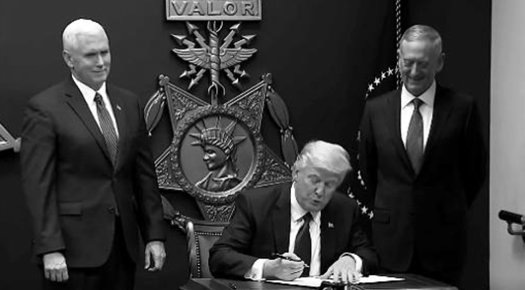
On January 27, 2017, Trump released an Executive Order 13769, “Protecting the Nation From Foreign Terrorist Entry Into the United States,” which, among other changes to immigration policies and procedures, bans for 90 days the entry into the United States of individuals from seven countries. All countries listed in this order are Muslim countries: Iraq, Iran, Libya, Somalia, Sudan, Syria, and Yemen.
The impact of the Executive Order was immediate and widespread, according to the 9th Circuit Court of Appeals. It was reported that thousands of visas were immediately canceled, hundreds of travelers with such visas were prevented from boarding planes bound for the United States or denied entry on arrival, and some travelers were detained.
Every country has its obligation to protect refugees. Trump's order flagrantly violates the core obligation to protect refugees by shutting the door to refugee admissions, whether temporarily or indefinitely. Article 3 of the Refugee Convention makes clear that all signatory states "apply the provisions … to refugees without discrimination as to race, religion or country of origin". Governments must select refugees for resettlement only on the basis of their needs, regardless of nationality, ethnicity, religion, or other related characteristics. Trump’s ban is a clear violation of the Refugee Convention.
This ban also violates the Religious Freedom Restoration Act and The International Convention on the Elimination of All Forms of Racial Discrimination, or ICERD, to which the US is bound, requiring states to "guarantee the right of everyone, without distinction as to race, color, or national or ethnic origin, to equality before the law."
In the case State of Washington, State of Minnesota vs. Donald J. Trump, President of the United States, the States argue that the Executive Order violates the Establishment and Equal Protection Clauses because it was intended to disfavor Muslims. The Equal Protection Clause likewise prohibits the Government from impermissibly discriminating among persons based on religion, according to Appeals Court. Never mind that the order doesn’t specifically mention Muslims, it is obvious that the order favors Christians.
Circuit Judges in the 9th Circuit ruling in Washington vs. Trump concluded:
“Finally, in evaluating the need for a stay, we must consider the public interest generally. On the one hand, the public has a powerful interest in national security and in the ability of an elected president to enact policies. And on the other, the public also has an interest in free flow of travel, in avoiding separation of families, and in freedom from 29 discriminations. We need not characterize the public interest more definitely than this; when considered alongside the hardships discussed above, these competing public interests do not justify a stay.”
Photo Credits: Wikimedia
